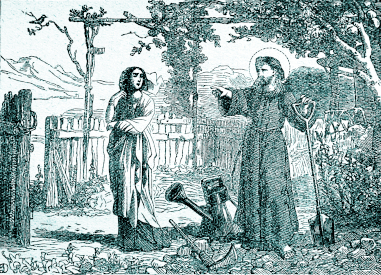Lives of the Saints
Our Models and Protectors
Spiritual Bouquet:
February 23

Saint Serenus
Martyr
(† 307)
Serenus was of the Greek nation by birth. He left estate, friends, and country to serve God in celibacy, penance, and prayer. With this design he bought a garden in Sirmium in Pannonia, now Hungary, which he cultivated with his own hands, and lived on the fruits and herbs it produced. During this time a persecution of the Christians was begun, and for a time he went elsewhere, but returned before long.
There came one night to his garden a woman with her two daughters, as if to walk about at leisure. Serenus, seeing them, advised them to withdraw, and to conduct themselves in the future as decency required of persons of their sex and condition, who should not be abroad at that late hour. The woman, stung at our Saint's charitable remonstrance, retired in confusion, but resolved on revenging the supposed affront. She accordingly wrote to her husband, an army officer, that Serenus had insulted her. He, on receiving her letter, went to the emperor to demand justice, and the emperor gave him a letter to the governor of the province, authorizing him to obtain satisfaction.
The governor ordered Serenus to be brought before him at once. Serenus, on hearing the charge, answered, I remember that, some time ago, a lady came into my garden at an unseasonable hour, and I admit I took the liberty to tell her it was against decency for one of her sex and quality to be abroad at such an hour. This plea of Serenus caused the officer to blush for his wife's conduct, and he dropped his suit. But the governor, suspecting by this answer that Serenus might be a Christian, began to question him, saying, Who are you, and what is your religion? Serenus, without hesitating, answered, I am a Christian. It seemed to me when you dismissed me that God rejected me as a stone unfit to enter His edifice, but now He will perhaps have the goodness to take me for it. I am ready to suffer all things for His name, that I may have a part in His kingdom with His Saints. The governor, hearing this, was furious and said, Since you seek to elude the emperor's edicts, and positively refuse to sacrifice to the gods, I condemn you for these crimes to lose your head. The sentence was no sooner pronounced than the Saint was carried off and beheaded, on the 23rd of February, in 307.
Reflection. The garden affords a beautiful emblem of a Christian's continual progress in the path of virtue. Plants always mount upwards, and never stop in their growth till they have attained to that maturity which the Author of nature has prescribed. So in a Christian, every desire of his soul, every action of his life should be a step toward that final end.
Les Petits Bollandistes: Vies des Saints, by Msgr. Paul Guérin (Bloud et Barral: Paris, 1882), Vol. 2; Little Pictorial Lives of the Saints, a compilation based on Butler's Lives of the Saints and other sources by John Gilmary Shea (Benziger Brothers: New York, 1894).